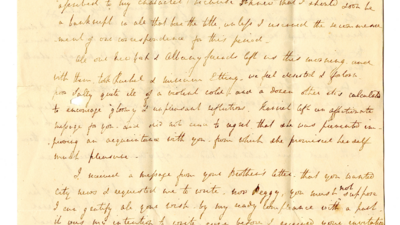John Jay Justice Award Program, May 6, 2014
Title
Date
Contributor
Summary
This document is a program for the 2014 John Jay Justice Awards, held on May 6, 2014. The event honors Elie Wiesel for his profound dedication to justice and human rights, a commitment deeply rooted in his experiences as a Holocaust survivor. The program features a welcome message from Jeremy Travis, President of John Jay College, alongside a detailed biography of Wiesel, highlighting his literary works, academic career, and human rights advocacy. It also explains the significance of the John Jay Medal for Justice. The program outlines the ceremony's schedule, including performances and presentations by notable figures such as Stephen G. Breyer, Sir Patrick Stewart, James Earl Jones, Simon Estes, Gil Shaham, Akira Eguchi, Anthony McGill, and Jessye Norman. Biographical sketches of these presenters and participants are provided. The document concludes with acknowledgments to key contributors, including Anne Beane Rudman for underwriting the event and Caroline Stoessinger for producing the program, and lists the members of the John Jay College Foundation Board of Trustees.
More Sources Like This
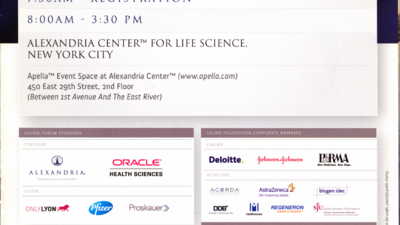
This document is the program for the Galien Forum 2012, held on October 16, 2012, at the Alexandria Center for Life Science in New York City. It outlines the day's agenda, including morning plenary sessions and simultaneous panels covering topics such as '21st Century Science: Building Partnerships, Managing for Success', 'Addressing Big Data Challenges in Genomics and Personalized Healthcare', 'Infectious Diseases: A Global Healthcare Challenge', 'Alzheimer's Innovation and the White House 2025 Mandate', 'Ethics of Innovation', 'The Changing Face of Chinese Healthcare', and 'Art and Science: From Anatomy to Genetics'. The program lists numerous speakers, moderators, and panelists from academia, industry, and government. It also acknowledges the event's sponsors and corporate members, and promotes the Prix Galien USA Awards Ceremony, featuring information about the award candidates in various categories. The document also includes a biographical sketch of the late scientist Arthur Donny Strosberg and mentions Francis S. Collins as the recipient of the 2012 Pro Bono Humanum Award.
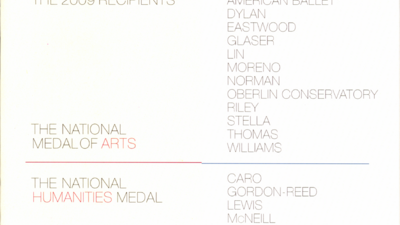
This document is a program booklet for an inaugural dinner held on February 24, 2010, at the Smithsonian National Museum of American History in Washington, D.C. The event honored the 2009 recipients of the National Medal of Arts and the National Humanities Medal. The booklet includes a welcome message from the Co-Chairmen of the President's Committee on the Arts and the Humanities, George Stevens, Jr. and Margo Lion, and outlines the evening's program, featuring toasts, a keynote address by Tony Kushner, and concluding remarks by Mary Schmidt Campbell. Detailed biographies of all 2009 medalists are provided, highlighting their significant contributions across various artistic and humanistic fields. The document also includes a dinner menu and an essay, "The Case for the Arts and Humanities," by Iowa Poet Laureate Marvin Bell, underscoring the importance of these fields to the nation.
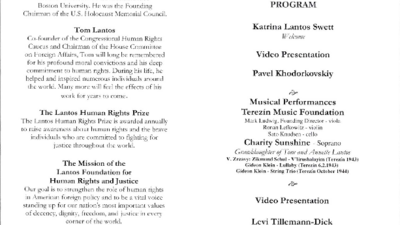
This document is the program for the 2010 Tom Lantos Human Rights Prize Award Ceremony, held on Wednesday, November 17, 2010, at Tishman Auditorium, The New School, New York, NY. The ceremony honored Elie Wiesel as the recipient of the prize. The program includes a welcome by Katrina Lantos Swett, video presentations, and musical performances by the Terezín Music Foundation, Charity Sunshine, and Levi Tillemann-Dick. Governor Bill Richardson presented the award, which Elie Wiesel accepted. The program provides biographies of Elie Wiesel and Tom Lantos, details the mission of the Lantos Foundation for Human Rights and Justice, and acknowledges various contributors, including founding humanitarians and those involved in video and photographic content. It also lists the Board of Trustees of the Lantos Foundation.
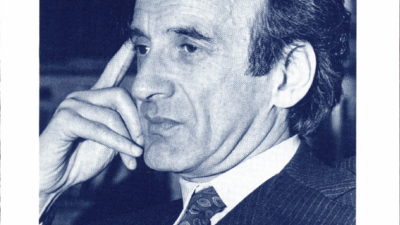
This document is a multi-page invitation and program for a dinner hosted by The National Committee on American Foreign Policy, held on May 7, 1987, at the St. Regis Roof in New York. The event honored Elie Wiesel, the 1986 Nobel Peace Prize Laureate. The document includes a biography of Elie Wiesel, detailing his early life in Romania, education at the Sorbonne, immigration to the United States, and his distinguished career as an author and professor, notably his writings on the Holocaust and his advocacy for human rights. It also lists the individuals and the organization inviting guests to the dinner, as well as the committee's leadership and founding information, established in 1974 to stimulate interest in American foreign policy.
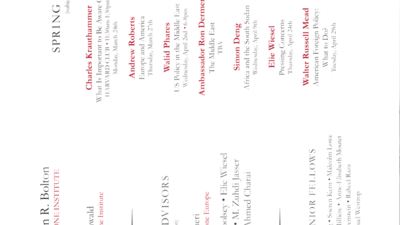
This two-page document from the Gatestone Institute outlines their "Spring Speaker Series" for 2014 and details their mission statement. Page one presents the schedule of lectures, listing prominent speakers such as Charles Krauthammer, Andrew Roberts, Walid Phares, Elie Wiesel, Walter Russell Mead, Frank Luntz, Garry Kasparov, and Mortimer Zuckerman. Each entry includes the topic, date, and sometimes the location (e.g., Harvard Club, Washington D.C.). The topics primarily revolve around US foreign policy, the Middle East, economic growth, and current geopolitical affairs. Page two provides the Gatestone Institute's mission statement, defining it as a non-partisan, non-profit international policy council and think tank focused on educating the public about global issues, advocating for democracy, human rights, and free markets. It also includes the institute's contact information and reiterates the list of distinguished speakers. The document indicates it is "BY INVITATION ONLY", functioning as a program and invitation for the event series.
